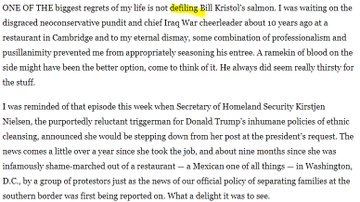Our goal is to have intelligent discussion of the topics of the day. We realize everyone has their opinion and they should be allowed to express it in a discussion forum without calling each other names. We learn from discussion and not from name calling or argument.We use cookies to personalise content and ads, to provide social media features and to analyse our traffic. We also share information about your use of our site with our social media, advertising and analytics partners. See details
Saturday, April 13, 2019
Friday, April 12, 2019
This Article Crossed The Line
Boston Globe Takes Down Piece Suggesting Waiters Should ‘Tamper’ with Trump Officials’ Food
The Boston Globe took down an opinion piece from its website in which the writer called for waiters to “tamper” with the food of Trump administration officials.
The article, titled “Keep Kirstjen Nielsen unemployed and eating Grubhub over her kitchen sink,” was written by Luke O’Neil — a former waiter and current freelance writer, who has contributed to multiple publications, including The Globe, The Guardian, The New York Times, and others, according to Fox News.
The original version of the story — which was first edited for “tone” and later unpublished — began: “One of the biggest regrets of my life is not pissing in Bill Kristol’s salmon.”
“I was waiting on the disgraced neoconservative pundit and chief Iraq War cheerleader about 10 years ago at a restaurant in Cambridge and to my eternal dismay, some combination of professionalism and pusillanimity prevented me from appropriately seasoning his entrée. A ramekin of blood on the side might have been the better option, come to think of it, he always did seem really thirsty for the stuff.”
Kristol is the founder and former editor-in-chief of the now defunct conservative publication The Weekly Standard.
O’Neil concluded the original version of his story by encouraging wait staff to “tamper” with Trump officials’ food, according to The Daily Wire.
“As for the waiters out there, I’m not saying you should tamper with anyone’s food, as that could get you into trouble. You might lose your serving job. But you’d be serving America. And you won’t have any regrets years later,” the columnist wrote.
After receiving significant blowback, The Globe edited the story, explaining with a note at the top, “A version of this column as originally published did not meet Globe standards and has been changed. The Globe regrets the previous tone of the piece.”
Like gender, marriage, and human-fish relations, the lede on a @BostonGlobe column is an evolving paradigm.
See Steve Robinson's other Tweets
Do you think The Globe was wrong to publish this story?
97% (1231 Votes)
3% (32 Votes)
The lede paragraph no longer mentioned “pissing in” Kristol’s salmon, but instead read that one of the biggest regrets in O’Neil’s life was “serving Bill Kristol salmon and not telling the neoconservative pundit and chief Iraq War cheerleader what I really thought about him.”
Likewise, the final paragraph no longer suggested tampering with Trump officials’ food, but instead exhorted, “And when they show up in our restaurants, you have my permission, as an official member of the mainstream media, to tell them where to go and what they can do with themselves when they arrive there, but, you know, said in a more specific and traditional Boston colloquialism.”
Shirley Leung — interim Globe editorial page editor, who presumably had at least some role in approving O’Neil’s Op-Ed — tweeted a link to the original version on her personal Twitter account.
Keep Kirstjen Nielsen unemployed and eating Grubhub over her kitchen sink https://t.co/57j8jfshOH via @lukeoneil47— Shirley Leung (@leung) April 10, 2019
Leung is also a news contributor for Boston Public Radio station WGBH.
A
The link for O’Neil’s story no longer works.
One reason may be that the piece potentially crossed the line from protected free speech to advocating harm against government officials.
Michele Blood, writing for The Federalist, noted freedom of speech is not an absolute right.
“The concern with O’Neil’s piece goes beyond his arguable incitement to possible threats against a sitting governmental official,” she explained. “The article as a whole, sandwiched by the personal introductory anecdote and the ending word-of-advice, suggests that it is entirely appropriate — even laudable — to express your political opinions through violence.”
O’Neil responded to the controversy on Twitter with a non-apology apology Wednesday evening before eventually locking his account.
“I would like to apologize for my commentary regarding the warden of the baby jail,” he tweeted in an apparent reference to Nielsen.
Mediaite included a screen shot of another O’Neil tweet, in which he wrote, “In the infamously left wing media you can write a op-eds advocating for turning muslim weddings into bloodbaths forever but it you say human right violators or war criminals deserve a pube on their salad its over the line.”
This Is What Happens When You Protest Hamas
What Happens to Palestinians Who Demand a Better Life?
Mohammed Safi, 27, is the latest victim of Hamas, the Palestinian Islamist movement that has been controlling the Gaza Strip since 2007. While voters in Israel were heading to the ballot boxes to elect a new parliament, Safi, who is from the town of Beit Lahia, in the northern Gaza Strip, is reported to have lost his eyesight while being held in a Hamas prison. His crime: participation in demonstrations calling for an end to the economic crisis in the Gaza Strip and protesting new taxes imposed by the Hamas rulers. The protests -- held under the banner "We Want to Live!" -- were the first anti-Hamas demonstrations of their kind in many years. Thousands of Palestinians in the Gaza Strip took to the streets during the protests and called for solutions to their horrific economic morass, including soaring unemployment and the skyrocketing cost of living. Safi was among the Palestinians who decided that they had had enough of the brutal and corrupt regime of Hamas. Like most men at his age, he wanted his Hamas leaders to do something to improve their living conditions. They wanted an end to repression and dictatorship. They wanted their leaders to offer them hope instead of sending them to fire rockets at Israel and demonstrate violently at the Gaza-Israel border. It now seems that Safi will never live literally to see Hamas removed from power. He will not live literally to see an improvement of living conditions and the economy in the Gaza Strip. According to Safi's family, he is now blind. He lost his eyesight, they say, under torture while being held by Hamas security forces for talking to people gathered on the streets to protest economic hardship. Most of the protesters said they had been brutally assaulted by Hamas security forces. Some complained that Hamas security officers had broken their arms and legs. Even senior Fatah officials such as Atef Abu Seif fell victim to Hamas's violent crackdown on peaceful demonstrators seeking job opportunities and a better life. The price that Safi paid, however, has probably been the highest. His family says he was detained for interrogation by Hamas security forces at least five times on suspicion of participation in the economic protests in mid-March in the Gaza Strip. His brother, Ahmed, said that Safi had already suffered from a neurological disease that affected one of his eyes. "When the [Hamas] security services took him away," Ahmed said, "We told them that he's supposed to undergo surgery in one of his eye. The officers ignored us. They didn't care about his health condition. During the interrogation, Safi complained that he wasn't able to see in one eye. In response, the interrogator hit him in the head from behind three times and told him: 'This is so you won't be able to see at all.' My brother is now in hospital after losing his eyesight." From his hospital bed, where doctors are trying to find ways to restore his eyesight, Safi confirmed that he had warned his interrogator about his health condition, but to no avail. He said: "I only have one request from all those who have a conscience, all those who care: I want to see again. That's all." A human rights group in the Gaza Strip called the Journalists Forum for Human Rights held the Hamas security forces fully responsible for the tragedy and called for a comprehensive investigation. It also called for holding those responsible to account and denounced the incident as a "human, moral and national crime." Safi's friends and several youth activists from the Gaza Strip who gathered near his hospital bed expressed outrage over the way he was treated during his incarceration by the Hamas security forces. "Like many Palestinians in the Gaza Strip, Mohammed Safi, who is lying here in Shifa Hospital, doesn't have media organizations to support him," said one of the youth activists, Rami Aman. "He and many Palestinians don't have the support of any organizations. Mohammed is now blind because of the actions of members of Hamas's security forces." Safi's case serves as a reminder how Palestinians living under the Palestinian Authority in the West Bank and Hamas in the Gaza Strip are continuing to suffer from repression, corruption and bad government. The Palestinian Authority and Hamas tolerate no criticism. They arrest political opponents almost on a daily basis. They throw them into prison and in many instances subject them to physical and mental torture. Safi is lucky to be alive, albeit now blind. He could easily have wound up dead. That is what happens to Palestinians who dare to stand up and speak out against their leaders. This week, Israel held its fifth election since the most "recent" Palestinian election. The last time the Palestinians held an election was in January 2006. Then, it was a parliamentary election that resulted in a Hamas victory. Since then, the leaders of the Palestinian Authority and Hamas have been fighting each other and denying their people the chance to hold a free and fair election. There is no room for democracy or free elections under the Palestinian Authority and Hamas. There is also no room for any voices calling for an improvement of living conditions and job opportunities. Safi was not even demanding new parliamentary or presidential elections. According to his family and friends, he does not even belong to a political group. He simply sought to communicate that Palestinians in the Gaza Strip are living under a brutal Islamist regime that has offered them nothing but terror -- directed towards Israel and towards themselves. He wanted the world to know that Palestinian leaders deflect the heat on the Palestinian street towards Israel. Had Safi headed towards the border to hurl bombs and rocks at Israeli soldiers and launch incendiary kites in the context of the Hamas-sponsored "Great March of Return," he would have been hailed as a hero by his Hamas leaders. Safi simply chose to speak truth to power and place the misery of the Palestinians in Gaza squarely where it belongs: at the feet of Hamas. He paid dearly for that choice. Meanwhile, Hamas leaders can now claim another "achievement" in their jihad against Israel: they managed to transform a clear-headed and courageous young man into a blind and disabled one. Khaled Abu Toameh, an award-winning journalist based in Jerusalem, is a Shillman Journalism Fellow at Gatestone Institute.
© 2019 Gatestone Institute. All rights reserved. The articles printed here do not necessarily reflect the views of the Editors or of Gatestone Institute. No part of the Gatestone website or any of its contents may be reproduced, copied or modified, without the prior written consent of Gatestone Institute.
|






